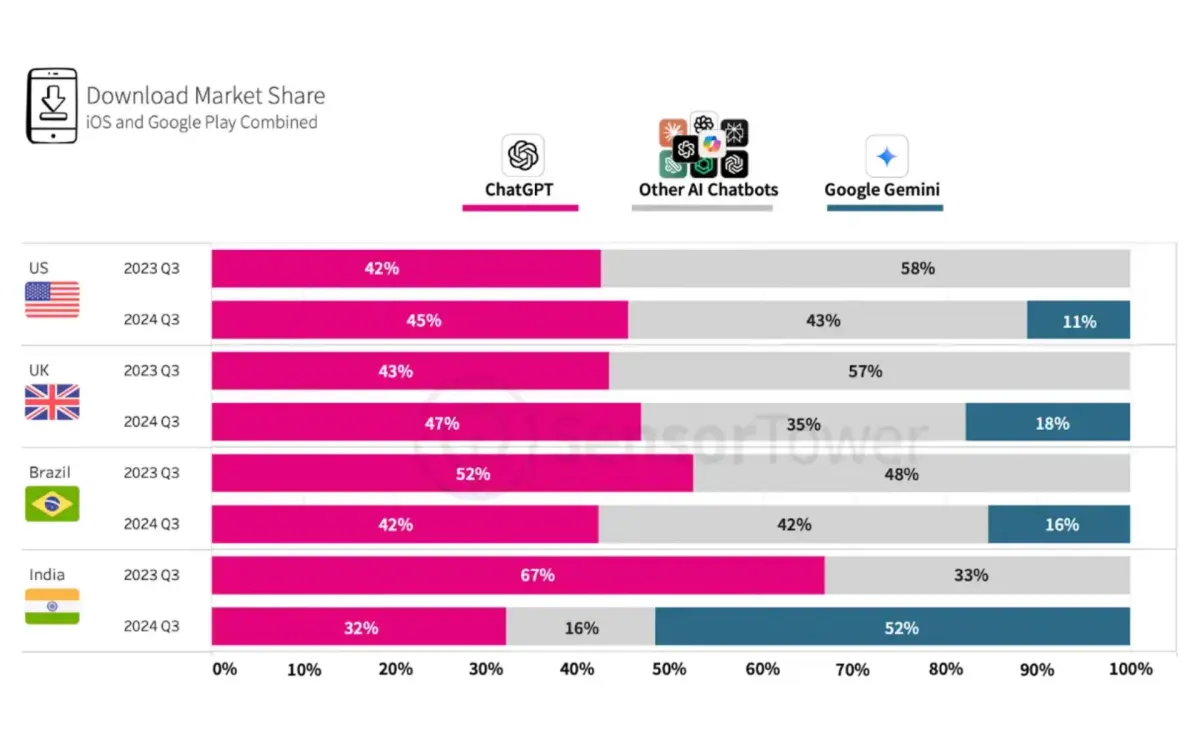
A recent market analysis released by Sensor Tower in December 2024 reveals the changing dynamics in the AI language application market. The report focuses on the third quarter of 2024 and shows both ChatGPT's strengths and emerging challenges.
In the United States, ChatGPT has strengthened its market leadership. The application's download share grew by 3 percentage points compared to the previous year, reaching 45% of total downloads. More importantly, its revenue performance showed remarkable growth, with mobile revenue increasing nine-fold compared to the previous year. This growth accelerated after May 2024, when ChatGPT released its enhanced GPT-4O model.
The speed of ChatGPT's user adoption has been particularly noteworthy. The platform reached 50 million monthly active users worldwide in just five months after launch. To put this in perspective, other successful applications like Disney+ needed 12 months and Temu required 8 months to achieve the same milestone.
However, the global picture shows increasing competition. In India, Google Gemini has made significant inroads, capturing over 50% of downloads in the third quarter of 2024. This marks a substantial shift, as ChatGPT's share in India fell to 32%, representing a decline of more than 30 percentage points from the previous year. Latin America has also proven challenging for ChatGPT, where it holds its lowest regional market share at 42%.
Character AI has emerged as a strong competitor in terms of user engagement. In the United States, 86% of its downloads came from organic sources, outperforming ChatGPT's 81%, Microsoft Copilot's 71%, Perplexity's 68%, and Google Gemini's 53%. This high organic download rate suggests strong word-of-mouth promotion among users.
 PPC LandLuís Rijo
PPC LandLuís Rijo
The report also reveals interesting patterns in how these AI applications target their advertising. California, particularly San Francisco, has become a key focus area. Claude dedicated 18% of its advertising budget to California, while Perplexity allocated 15%. This suggests a strategic focus on technology-savvy urban markets.
Different AI platforms have shown distinct user demographics and behaviors. For instance, Perplexity has found particular success among urban users, with 42% of its users also using Uber, compared to lower rates for ChatGPT and Copilot users. Meanwhile, Microsoft Copilot users show strong loyalty to other Microsoft products, suggesting successful ecosystem integration.
While the United States remains ChatGPT's largest market by total revenue, the platform achieves its highest revenue per download in Switzerland, followed by South Korea and Japan. This variation indicates that monetization success differs significantly across regions, pointing to the complexity of global market dynamics in the AI application space.

